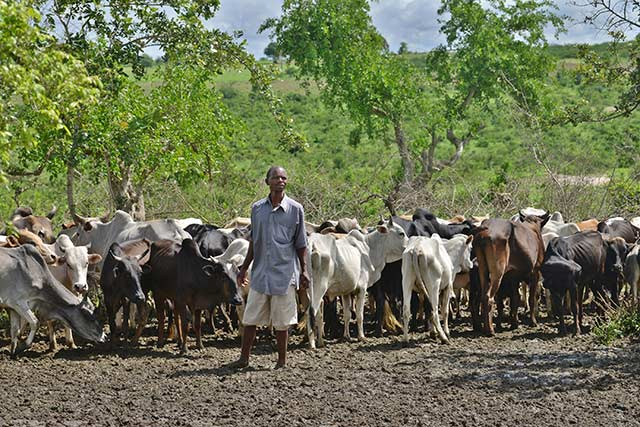The National Livestock Reforms Committee has proposed the establishment of a dedicated Ministry of Livestock to oversee and address the pressing issues related to clashes between farmers and herders in the country.
The committee led by the national chairman of the All Progressives Congress (APC), Abdullahi Ganduje, yesterday submitted its recommendations for reforming the livestock industry to President Bola Tinubu at the presidential villa in Abuja.
Ganduje noted that there are four distinct categories of herders in Nigeria, including those who settle at home, Nigerian herders who move across regions, herders from neighboring West African nations, and those who have become integrated into certain ethnic communities as indigenes.
Ganduje emphasized the need for innovative approaches to livestock production, particularly given factors like population growth, ecological changes, and shifting climates.
He said previous attempts to improve the industry faced challenges such as inadequate planning, funding, and weak extension services.
The immediate past Kano governor said, “It is gratifying to lead this team of patriotic Nigerians and experts in various fields of human endeavour before Mr. President to present the report of the national conference on Livestock reforms.
“The report grew out of the urgent need to reform and develop the livestock industry and to provide solutions to the age-long conflicts between herders and farmers in Nigeria.
“The low productivity of the sector has made Nigeria an import dependent economy draining scarce foreign reserves used for importing dairy, meat and other livestock products. Similarly, the conflict is resulting in killings of citizens and loss of livelihoods, further affecting peaceful coexistence in the country.
“With increasing populations, ecological changes such as soil erosion and degradation of grazing areas and changing climates, adopting innovative crops and livestock production practices are no longer luxury but an essential investment that this people centred administration under your leadership needs to vigorously pursue.
“There have been repeated attempts to develop the livestock industry with varying levels of failures and successes. The adoption of improved production practices that will increase productivity and help the cattle owners to permanently settle have been abysmal due to many factors such as inadequate planning and funding of programmes, weak extension services as well as other cultural, economic and technological barriers.
“The persistence of these problems has allowed unhealthy competition and acrimony to grow among farmers and herders resulting in violent conflicts across the country.”
Drawing from his experience as governor of Kano State, Ganduje highlighted the importance of modernizing livestock production while also promoting conflict resolution at the local level, which contributed to Kano State’s relative peace during his tenure.
He said, “It is these and other related experiences that this Committee reviewed and analysed, while also drawing from varied experiences across the World to come out with practical recommendations for reforming the livestock industry at the national level.
“The committee that prepared this Report is made up of eminent Nigerians under the Chairmanship of Prof Attahiru Jega with members from the organised private sector, academia, practising pastoralists and farmers, representatives of farming and pastoralists communities, civil society organisations and specialists in various fields of livestock development and conflicts management.
“They worked assiduously to organize a national conference on 13th and 14th February 2023 with about 500 participants including traditional rulers, technocrats, bureaucrats, practitioners, farmers and pastoralists organisations, civil society organisations, international organisations, development experts and other range of professionals and stakeholders at national and international levels contributed to the discourse on the most viable options for achieving sustainable modernization of livestock production and achieving peaceful and harmonious relations between farmers and pastoralists. “
The APC national Chairman told President Tinubu that the report submitted to him has the antidote to the problems of the livestock industry.
“It addresses the key reforms and presents various development options needed for the sustainable development of the sector,” he stated.
Ganduje said the implementation of the proposals will enhance productivity, improve livelihoods, promote environmental conservation, address substantial causes of conflicts between farmers and pastoralists and help in reducing the high cost of imports of animal products like milk and beef.
Fielding questions from State House correspondents on the response of the president after receiving the report, Ganduje said, “Let me start with a proverb that says “it is easy to declare war, but it’s difficult to wage it,” meaning that we have made a number of important recommendations because we studied previous attempts; the failures, the successes, we put them together and made recommendations to Mr President.
“But in order to find the practical solution that will provide the desired goals, you’ll need a strong institution.
“We recommended the establishment of ministry of Livestock and subsequent agencies so that various aspects of the recommendations will have appropriate institutions for implementation.
“We also recommended a source of funding, including international organizations, the private sector, the government itself, and so many other things. So, the answer we get is that Mr. President is ready to provide solutions to these problems, especially pertaining to the economy of the livestock and then the security aspects of the herders-farmers’ conflict”.





